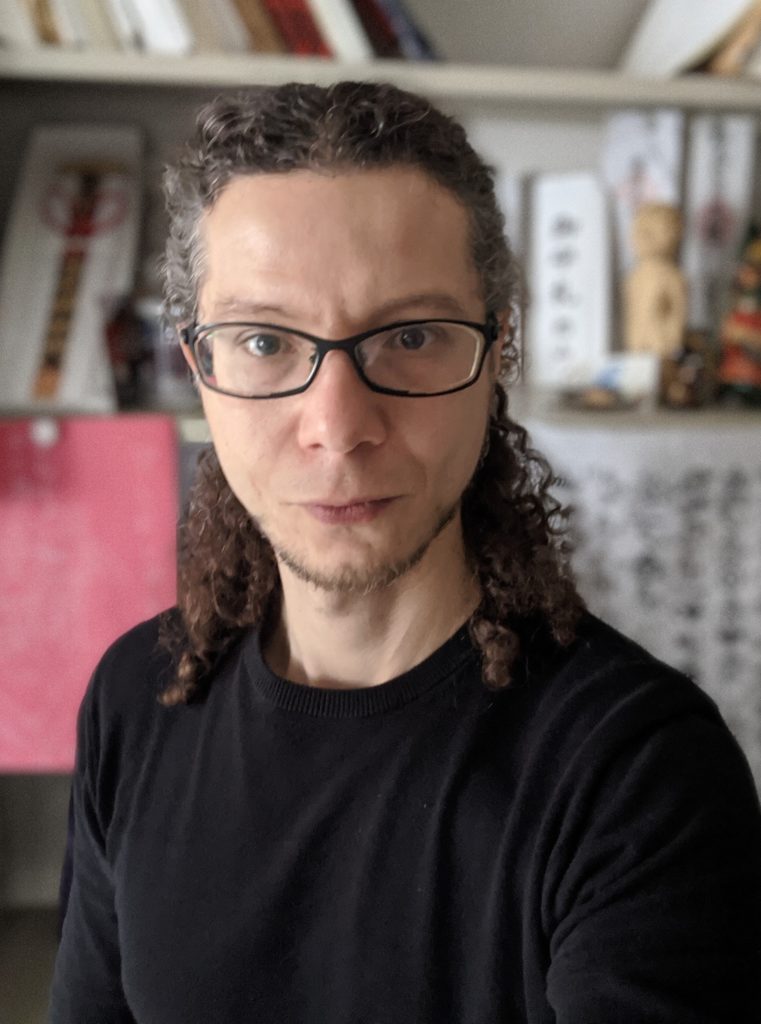Prof. Dr. Andrea DE ANTONI
My name is Andrea De Antoni. I am Italian, but I have lived in Kyoto for the past ten years.
I have been an EAJS Member since 2008, when I was also invited to the TIFO Recipients Meeting. I was a Ph.D. student in Venice at the time and those were my first experiences in the International Academic Community. This created some affective connection with the EAJS, one of the reasons why I was honoured to serve as a Council member since 2017, and I gladly accept this nomination.

Since 2008, I have also been an active member of the “Japan Anthropology Workshop (JAWS),” and Main Editor of the Newsletter (2010-2018). In 2017 I had the honour to convene the Anthropology and Sociology Section at the EAJS Conference in Lisbon and I was elected as a Member of the EAJS Council. Since I am also a member of the “Anthropology of Japan in Japan (AJJ)” Executive Committee, I guess I have become the ‘missing link’ between anthropology and Japanese studies, and anthropologists of Japan in Europe and in Japan.
In these three years as a Council member, I have tried to support EAJS-JAWS relations, and to propose and support innovative ideas, such as the new Conference section for ethnographic films and documentaries. I am glad to be given the possibility to serve again as a Council member for the next term, in order to continue working towards innovation in the EAJS, to support the creation of new relationships and international research projects with Japan, and to help with the EAJS Japan Conference. In short, I am glad to continue building bridges as a ‘proper’ Venetian…
Curriculum Vitae
Since 2014 I have been an Associate Professor at Ritsumeikan University (Graduate School of International Relations) in Kyoto, where I teach courses (in English and Japanese) and supervise Undergraduate and Postgraduate Students on topics related to anthropology and religious studies, Contemporary Japanese society, and Religions in contemporary Japan. I was also an Adjunct Lecturer (2013-2019) at the University of Vienna (Department of Social and Cultural Anthropology), where I taught Anthropology of Religion, and in Venice (2010), where I taught Japanese language and Japanese Religions in Contemporary Japan.
My doctoral research (Ca’ Foscari University of Venice, 2007-2010) focused on places connected to hell and the afterlife in contemporary Japan (Osorezan, Rokuhara in Kyoto, Tateyama, Hakone and Hirano Ward in Osaka). This led me to consider perceptions of places and spaces related to death, touristization, social memory and identity, in particular linked to discrimination against outcastes (burakumin) and Koreans.
I spent two years as a Postdoc (Japanese Society for the Promotion of Science) at Kyoto University, doing fieldwork on a tour of haunted places in Kyoto, focusing on experiences in haunted places and looking into the field of “dark tourism”. In the following years, I started teaching at Ritsumeikan and Doshisha Universities.
My present research focuses on spirit/demonic possession and exorcism in contemporary Japan, Italy and Austria from a comparative perspective. I recently started a project on contemporary spiritual healing in Okinawa. I am also the coordinator of the international research network “Skills of Feeling with the World: Anthropological Research on the Senses, Affect and Materiality,” based in Ritsumeikan University.
List of selected publications
I published articles and edited works in Italian, English and Japanese on these topics, including
Feeling (with) Japan: Affective, Sensory and Material Entanglements in the Field. Special Issue of Asian Anthropology 18(3), 2019 (co-edited with Emma Cook).
“Affect.” In Callan, H. (ed.). International Encyclopedia of Anthropology. John Wiley & Sons, pp. 1-8, 2019.
“Came Back Hounded: A Spectrum of Experiences with Spirits and Inugami Possession in Contemporary Japan.” In Rambelli, F. (ed.). Invisible Empire: Spirits and Animism in Contemporary Japan. Bloomsbury, pp. 109-125, 2019.
“Down in a Hole: Dark tourism, Haunted Places as Affective Meshworks, and the Obliteration of Korean Labourers in Contemporary Kyoto.” Japan Review 33: 271-297, 2019.
The Practices of Feeling with the World: An Anthropology of Affect, the Senses and Materiality. Special Issue of Japanese Review of Cultural Anthropology 18(1), 2017 (co-edited with Paul Dumouchel)
Death and Desire in Modern and Contemporary Japan. Venice: Ca’ Foscari University Press, 2017 (co- edited with Massimo Raveri).
